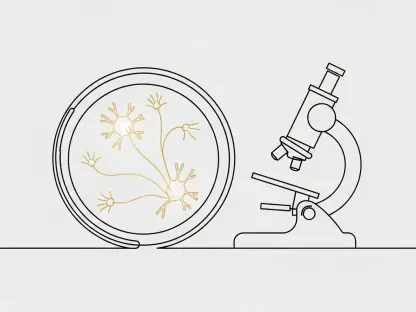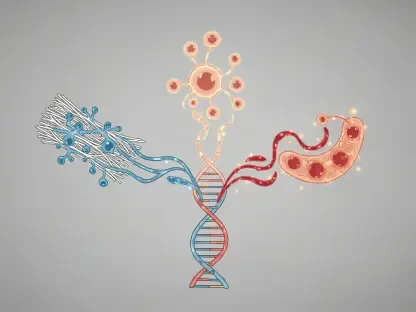Historically, anaplastic thyroid cancer (ATC) has been one of the most aggressive and challenging forms of cancer to treat, with traditional methods often resulting in poor survival rates. Treatment has remained a significant struggle, causing dismay for both patients and healthcare providers. However, a revolution is underway in oncology, driven by the promising advancements in precision medicine, immunotherapy, and artificial intelligence (AI). These cutting-edge technologies offer a new ray of hope to those affected by ATC, presenting opportunities for more effective and personalized treatments that aim to improve patient outcomes significantly.
Precision Medicine: A Targeted Approach
Precision medicine represents a monumental shift in cancer treatment, especially for conditions like ATC. Unlike traditional one-size-fits-all therapies, precision medicine leverages genetic profiling to create highly personalized treatment plans targeting the unique mutations in each individual’s cancer. This nuanced approach ensures that therapies are not only more effective but also tailored to minimize side effects, enhancing the overall quality of life for patients. By identifying specific genetic aberrations, oncologists can deploy targeted treatments, making interventions more accurate and effective.
Recent studies and clinical trials underscore the efficacy of precision medicine. Patients with ATC, who previously had very limited options, now find themselves benefiting from targeted therapies leading to better outcomes. For instance, specific inhibitors targeting mutations such as BRAF or RAS have shown promising results. These advancements mean that treatments are no longer a blanket approach but rather a focused strategy aimed at the cancer’s Achilles’ heel. This breakthrough not only prolongs survival but also offers an improved quality of life, lessening the burden of harsh side effects typically associated with cancer treatment.
Immunotherapy: Harnessing the Body’s Own Defenses
Immunotherapy has emerged as a groundbreaking advancement in the battle against ATC. This innovative treatment leverages the body’s immune system to recognize and combat cancer cells more effectively. Immunotherapy’s success lies in its ability to train the body’s natural defenses to target malignant cells with greater precision, leading to enhanced survival rates and a significantly improved quality of life. In numerous clinical trials, patients with ATC have shown remarkable responses to immunotherapy, which were previously unimaginable with conventional treatments.
Checkpoint inhibitors, a type of immunotherapy, have notably revolutionized treatment protocols for ATC. These inhibitors block proteins that prevent the immune system from attacking cancer cells. As a result, the immune system can identify and eradicate these cells more effectively. The transformative impact of immunotherapy has led to extended survival, even for patients with advanced or metastatic ATC. Additionally, ongoing research into combination therapies, where immunotherapy is used alongside other treatments, holds the promise of unleashing even more potent anti-cancer effects, further revolutionizing patient care.
The Power of Artificial Intelligence in Oncology
Artificial intelligence has the potential to revolutionize oncology by processing vast and complex datasets quickly and accurately. AI offers oncologists a powerful tool to identify patterns, make predictions, and tailor treatments with a precision that was previously unattainable. This technology is particularly crucial for managing aggressive cancers like ATC. By utilizing AI, clinicians can develop predictive models that inform treatment plans and anticipate patient responses, optimizing outcomes.
AI’s capabilities extend beyond treatment to improve diagnostic accuracy as well. Advanced algorithms can analyze medical imaging and pathology slides with extraordinary precision, aiding in the early detection of ATC and other cancers. The integration of AI into clinical practice also helps streamline decision-making processes, allowing for faster and more accurate treatment adjustments. Furthermore, AI-driven platforms assist in the identification of suitable clinical trials, widening opportunities for patients to access the latest experimental therapies.
The transformative nature of AI in oncology offers a glimpse into the future of cancer treatment. However, alongside these advancements, challenges and controversies persist. The high cost of AI-driven treatments may limit accessibility for some patients, and concerns about data privacy and the ethical use of patient information remain significant issues. Despite these hurdles, the potential benefits of AI in enhancing treatment outcomes for ATC cannot be understated, encouraging continued innovation and integration into medical practice.
Future Outlook and Remaining Challenges
Historically, anaplastic thyroid cancer (ATC) has been one of the most aggressive and difficult forms of cancer to treat, often yielding poor survival rates with conventional methods. This has made treatment a significant challenge, causing distress for both patients and healthcare providers. However, the field of oncology is experiencing a transformation thanks to remarkable advancements in precision medicine, immunotherapy, and artificial intelligence (AI). These cutting-edge technologies offer a glimmer of hope to those impacted by ATC, as they present opportunities for more effective and personalized treatment options. The integration of AI and precision medicine allows for tailoring treatments to individual patients, potentially leading to much better outcomes. Immunotherapy, which uses the body’s own immune system to fight cancer cells, is another promising development in the battle against ATC. Together, these innovative approaches are paving the way for treatments that not only aim to extend survival but also improve the quality of life for patients facing this formidable disease.









